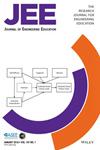Comprehending multiple identities as minoritized students in engineering: How can diverse developmental networks grow meaning-making capacity?
Abstract
Background
Mentoring is an important developmental relationship that can positively impact student growth, specifically, students' capacity to make sense of their own selves through addressing any possible incongruence between their social identities and emerging professional identity as engineers. This need is even more pronounced for students who have one or more identities that are minoritized in the field of engineering.
Purpose
Although prior literature has reported mentoring to have contributed to students' professional identity development as engineers, we lack an understanding of how multiple developers in students' developmental networks can offer complementary support. To address this gap, we sought to understand how diverse developers in students' networks enabled them to filter stereotypes that make their minoritized social identities incongruent with their evolving engineering identity.
Design/Methods
We used an idiographic case study methodology and paired interpretative phenomenological analysis (IPA) with intersectionality to analyze data from 10 undergraduate minoritized engineering students.
Results
We offer three cases in this paper to illustrate minoritized students experiences at the intersections of their identities and how different developers offered three types of holding behaviors (e.g., empathic acknowledgment/confirmation, enabling perspective/contradiction, containment/continuity) that enabled the student mentees to grow their meaning-making capacity (from formulaic to foundational) so that they could align their social identities with their emerging professional identity as engineers.
Conclusion
We conclude the paper with a discussion of both research and practice implications about utilizing diverse developmental networks for growing students' meaning-making capacities needed for them to better comprehend their multiple identities.

 求助内容:
求助内容: 应助结果提醒方式:
应助结果提醒方式:


